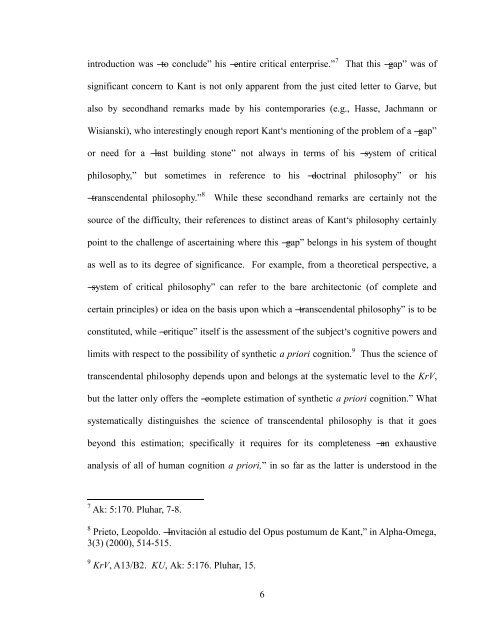The Doctrine of Self-positing and Receptivity in Kant's Late ...
The Doctrine of Self-positing and Receptivity in Kant's Late ...
The Doctrine of Self-positing and Receptivity in Kant's Late ...
Create successful ePaper yourself
Turn your PDF publications into a flip-book with our unique Google optimized e-Paper software.
<strong>in</strong>troduction was ―to conclude‖ his ―entire critical enterprise.‖ 7 That this ―gap‖ was <strong>of</strong><br />
significant concern to Kant is not only apparent from the just cited letter to Garve, but<br />
also by secondh<strong>and</strong> remarks made by his contemporaries (e.g., Hasse, Jachmann or<br />
Wisianski), who <strong>in</strong>terest<strong>in</strong>gly enough report Kant‘s mention<strong>in</strong>g <strong>of</strong> the problem <strong>of</strong> a ―gap‖<br />
or need for a ―last build<strong>in</strong>g stone‖ not always <strong>in</strong> terms <strong>of</strong> his ―system <strong>of</strong> critical<br />
philosophy,‖ but sometimes <strong>in</strong> reference to his ―doctr<strong>in</strong>al philosophy‖ or his<br />
―transcendental philosophy.‖ 8 While these secondh<strong>and</strong> remarks are certa<strong>in</strong>ly not the<br />
source <strong>of</strong> the difficulty, their references to dist<strong>in</strong>ct areas <strong>of</strong> Kant‘s philosophy certa<strong>in</strong>ly<br />
po<strong>in</strong>t to the challenge <strong>of</strong> ascerta<strong>in</strong><strong>in</strong>g where this ―gap‖ belongs <strong>in</strong> his system <strong>of</strong> thought<br />
as well as to its degree <strong>of</strong> significance. For example, from a theoretical perspective, a<br />
―system <strong>of</strong> critical philosophy‖ can refer to the bare architectonic (<strong>of</strong> complete <strong>and</strong><br />
certa<strong>in</strong> pr<strong>in</strong>ciples) or idea on the basis upon which a ―transcendental philosophy‖ is to be<br />
constituted, while ―critique‖ itself is the assessment <strong>of</strong> the subject‘s cognitive powers <strong>and</strong><br />
limits with respect to the possibility <strong>of</strong> synthetic a priori cognition. 9 Thus the science <strong>of</strong><br />
transcendental philosophy depends upon <strong>and</strong> belongs at the systematic level to the KrV,<br />
but the latter only <strong>of</strong>fers the ―complete estimation <strong>of</strong> synthetic a priori cognition.‖ What<br />
systematically dist<strong>in</strong>guishes the science <strong>of</strong> transcendental philosophy is that it goes<br />
beyond this estimation; specifically it requires for its completeness ―an exhaustive<br />
analysis <strong>of</strong> all <strong>of</strong> human cognition a priori,‖ <strong>in</strong> so far as the latter is understood <strong>in</strong> the<br />
7 Ak: 5:170. Pluhar, 7-8.<br />
8 Prieto, Leopoldo. ―Invitación al estudio del Opus postumum de Kant,‖ <strong>in</strong> Alpha-Omega,<br />
3(3) (2000), 514-515.<br />
9 KrV, A13/B2. KU, Ak: 5:176. Pluhar, 15.<br />
6


